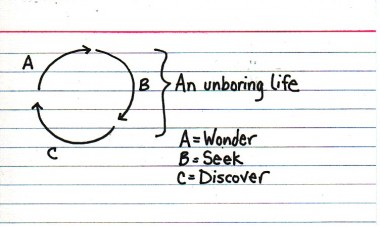Philosophy
Thoughts on thoughts
I do wonder why I wonder about what I do.
WHAT I KNOW FOR CERTAIN...
2010-02-24 21:38:12
by: jovial_cynic
by: jovial_cynic

As the body grows older, the general elasticity of the human anatomy decreases, affecting everything from the skin, the arteries, our heart, and perhaps most worrisome... the mind. Our conscious mind is a byproduct of physical pathways, bound by the same material laws that govern pretty much everything; the neural pathways that allow our brains to make relationships between concepts become less flexible, and we become more "rigid" in our thinking.
As it relates to complex issues (politics, theology, etc.), the idea of an inflexible mind is particularly troubling. Not just in others (although that's always frustrating), but in myself as well. A lack of mental exercise could result in an intellectual paralysis, or a physical inability to think beyond the parameters of a lifetime of assumptions... it's frightening, really.
Supposing that we have to end up somewhere... that our way of thinking will calcify over time, perhaps acknowledging that we might be wrong is the best mental exercise. A conscious decision to entertain alternative perspectives may ward off unwanted rigidity.
But who knows? I could be wrong...
comments [0]
PERPETUAL WONDER
2009-03-30 09:44:08
by: jovial_cynic
by: jovial_cynic

I really enjoy Jessica Hagy's daily index cards, partly because they're generally humorous, and partly because I enjoy graphic representation of abstract data.
Anyhow, today's card is particularly meaningful to me, as it describes my outlook on life. Life is never-ending adventure for me. The more I seek, the more I discover, and the more amazed I become... which compels me to seek more.
comments [2]
ON GROWING
2009-01-22 11:12:53
by: jovial_cynic
by: jovial_cynic

image: Solitary drop (cc) jsarcadia
I strive for growth in my personal life. Branded in my sense of self is this notion that life is growth, and that the moment one believe they've learned or accomplished it all is the moment they've begun their trek towards decay and death.
A while back, I found this article regarding growth through adversity. Or more accurately, it appears to claim that a certain level of growth is not possible without adversity.
Our relatedness brings us into reality, provided we are open to it. For instance, we prefer to avoid those people who annoy us, upset us, rub us the wrong way, push our buttons. Yet these are precisely the people who can help us to grow. Our reaction to them exposes the egoism we try to hide, the fear we suppress, the spite we pretend isn't there. Let's ask ourselves, "Who is the person I most hate to be around?" We need that very person in order to be real.
Relationships show us what's truly happening in our life, if we have the courage to face it. They reveal this separate, unreal self of ours who wants to isolate us from the rest of the human race. If we come to church on Sunday with the notion, "I'm here to be alone with God, I'm here to do my private devotion," we're living in a dream world. There is no such thing as a solitary Christian.
Terence Grant, The Silence of Unknowing
It's fascinating to me. The few comments under the post on that link make mention of "toxic" individuals who do more than simply irritate us, and are, in fact, harmful to our well-being. I think it takes some wisdom to discern which people in our lives fall into that category... but overall, I think I agree with the quote. Our unkind statements about people around us may actually be statements about our inability to handle situations we don't expect or desire, revealing our weaknesses to others, while leaving us blind to it. Perhaps intentionally placing ourselves in the presence of those with whom we have the greatest difficulty is what we need in order to learn how to gracefully and properly handle those situations.
comments [5]
np category: philosophy
technorati tags: philosophy growth personal development adversity solitary christian Terence Grant
technorati tags: philosophy growth personal development adversity solitary christian Terence Grant
INTO THE BIGGER PRISON
2008-11-03 21:34:53
by: jovial_cynic
by: jovial_cynic

image: Prison Cell (cc) Still Burning
I have these fleeting thoughts about the nature of reality. I periodically get caught in a Blakeian loop while trying to figure out what parts of the universe are just constructs of our minds, and what part of it is truly real. I'm not thinking about it on any sort of heavy theological sense, but at the same time, reducing it to mere philosophy seems too whimsical and inconsequential. There seems to be some life-impacting perspective change involved.
I got to thinking about prisons, recently. Of the mind.
As near as I can figure, we enter existence as prisoners of our biology. There's the animal part of our brain that we, as newborns, are incapable of ignoring. Our brains pick up the signals from our organs and environment (hungry, tired, uncomfortable), which our mouths amplify into a scream. Because that's pretty much all babies do. Scream, scream, scream.
It isn't until some socialization happens (positive/negative reinforcement) that some of the animal impulses are curbed, and we cheer the idea that the child has grown out of that baby phase. After a few years, children learn things like the potty dance because having urine dribble down the legs is more socially unacceptable than it is uncomfortable. Likewise, we see people consciously forgoing meals (ignoring their hunger) for the purpose of dieting. Instant gratification gives way to the idea of a future reward -- in this case, the loss of weight.
But the reality is that people merely climb out of one prison and into the next. Instead of individual biology dictating behavior, now it's society... which is sort of the larger human super-organism. And society is really just more biology, if you think about it.
Nearly all adult behavior is dictated by this whole notion of a pecking order. What is the goal of weight-loss but submission to some sort of societal norm? Why are humans are irresistibly drawn to shopping centers and retail outlet malls? It's because their behavior is dictated by society, and society seems intent on keeping everyone in some line or another. And in the same way that children aren't aware that they are prisoners of their biology, most adults aren't aware that they are prisoners of their society.
However, there are some folks who have at least a peripheral awareness of the forces of society, and intentionally ignore the social cues that guide most people. Some of these might be hermits, or monks, or otherwise eccentric folks... but I can't help but thinking that upon breaking free of society's prison, these people find themselves confined by yet another cage: the rules that govern reality itself. The fundamental laws of the universe. No paradigm shift is going to let anyone get around gravity, or the speed of light, or entropy. Reality is a big place; it's an awfully large cage.
The problem, of course, is this whole question of the nature of reality.
If reality is the last prison, and if reality exists only in our minds (via perception), did we ever leave the infant stage? As long as it is true that our ego is a biological construct, tasked with superimposing a consciousness, or "sense of self," over an otherwise mechanical brain, we are forced to acknowledge that even this prison of reality is actually that same first biological prison. In which case, we've simply managed to peel back a single layer of the fractal walls that confine us, and we've gotten no closer to escaping anything.
comments [6]
np category: philosophy
technorati tags: philosophy reality prison philosophy fractals society sociology biology
technorati tags: philosophy reality prison philosophy fractals society sociology biology
PHILOSOPHY OF RESPONSIBILITY
2008-08-13 08:31:06
by: jovial_cynic
by: jovial_cynic

image: Seattle Bridge Traffic (cc) DelScorchoSauce
I've got an idea brewing in my head. I'm not sure how it all plays out yet, but I wanted to post it to see what kind of reaction I got out of it.
I've got several broad sweeping philosophies about life, none of which are meant to be set in concrete, but rather serve to provide some framework for how I handle general decisions in my life. Some of these philosophies emerge out of a pattern of my behavior; that is, I discover that the reason for my actions is because of this underlying way of viewing the world -- I simply hadn't put words to the philosophy yet. In other cases, I stumble upon a new philosophy and begin to change my behavior to align with that new way of thinking, just to flesh it out and see how it works.
I recently encountered a philosophy on responsibility. Not in the "how to be a responsible person" sort of way, but rather the "how should we view the things over which we are responsible" idea. A co-worker and I chatted a bit over the issue of responsibility as it relates to private transportation, and we noted that the act of driving puts us in a situation where we are responsible for something that can cause much more damage than we are capable of repairing. A collision can cost hundreds of thousands of dollars, and people can die. In 2006 alone, there were 38,588 fatal car crashes. That's rather mind-boggling.
But we don't think about this. As a society, we are comfortable paying insurance companies a premium to take on that responsibility so that we can continue our lifestyle without worrying about the consequences. We simply pass the burden.
While driving with auto insurance is viewed as the "responsible" thing to do, I wonder if it does, in fact, make us less responsible people. A less responsible society. By engaging in risky activity and ignoring the potential consequences (because we know someone else will clean the mess), we behave like people in the 18-22 age bracket that think that they are responsible, but they know that they can always call their parents to bail them out of debt or jail or whatever other trouble they've encountered. This isn't being responsible. This is letting others be responsible for our actions. I can't help but feel that if people were personally liable for any damages they caused while driving, people would drive quite differently. Or not at all.
And I wonder what else would be impacted if people embraced a personal-responsibility philosophy? I don't know how far it could reach... but I do know that if people only engaged in activity that they could personally afford to cover, debt simply wouldn't exist. Would a different world that would be.
comments [6]
2008-07-29: THE MANUFACTURED MIND 2008-06-30: PSYCHOLOGICAL RECURSION 2007-11-30: ROMANCE AND LONELINESS 2007-02-21: THE VANITY OF WEALTH 2006-12-21: GRINDING FRACTAL GEARS 2006-04-28: SOLIPSISM 2006-04-28: INSANITY 2006-04-16: A HUMAN BEING SHOULD...

